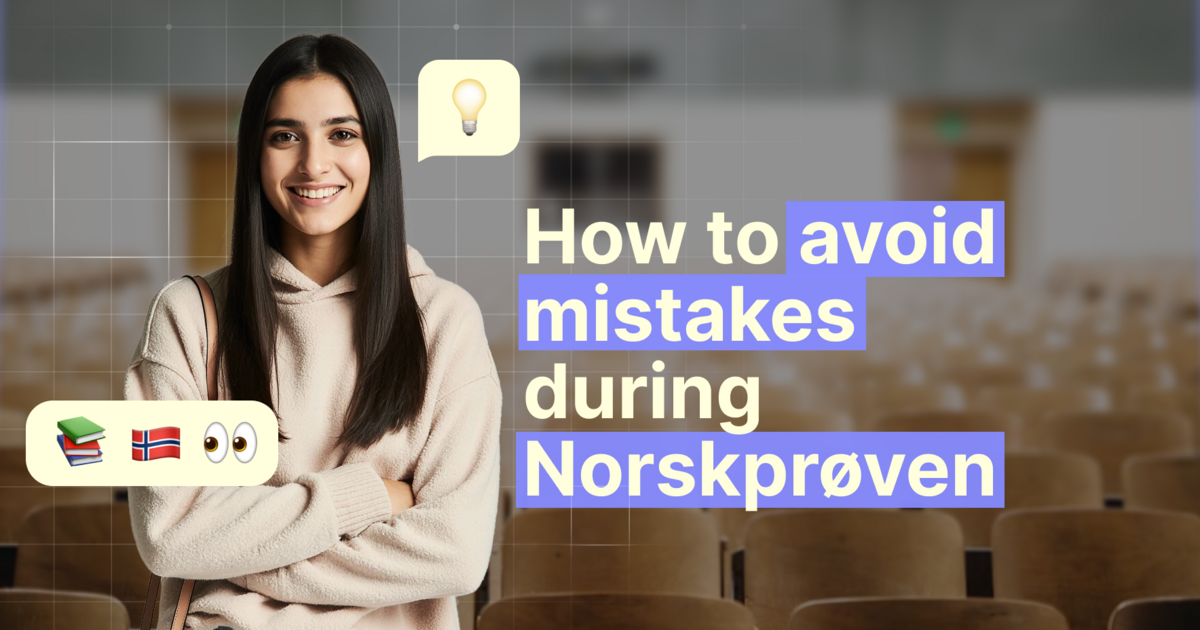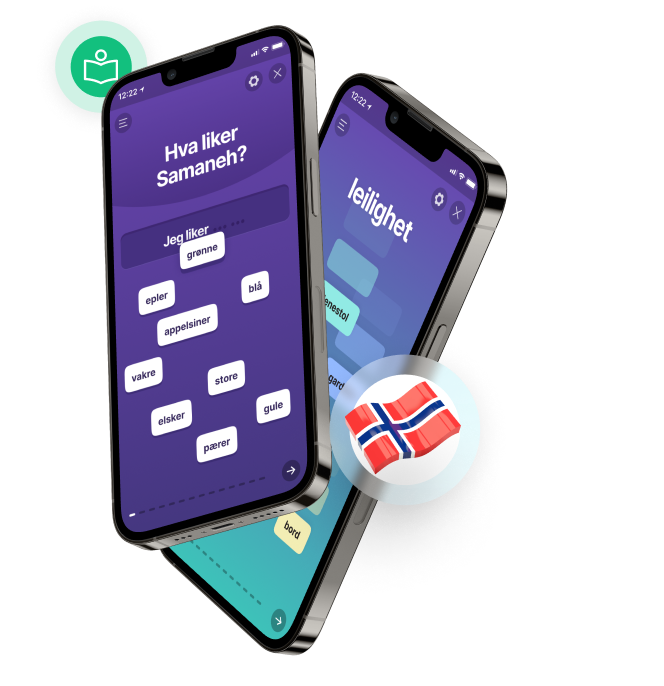5 common mistakes on Norskprøven and how to avoid them
Discover the 5 most common mistakes on Norskprøven. Learn how to avoid them with expert tips, effective study strategies, and recommended online Norwegian courses.

Are you preparing for Norskprøven? Whether your goal is to settle in Norway, advance in your career, or simply feel more confident in Norwegian, you want the best possible result on this important exam. You might worry about making mistakes that could lower your score - this is very common, no matter your language level.
The good news is that you can avoid the most common pitfalls with a focused approach, smart strategies, and the right resources. In this guide, you will discover the five most common mistakes people make on Norskprøven. More importantly, you will learn how to overcome them. Along the way, you will find practical examples, reflection questions, and concrete steps that work for both beginners and advanced learners, including those enrolled in a Norwegian language course.
Curious to find the smartest ways to reach your goal? Keep reading, ask yourself the right questions, and see how you can build a preparation plan that sets you up for success - no matter where you start.
If you want a deeper overview of the test format, scoring, or signing up, check out more information at Hva er Norskprøven?. Now, let us get started!
1. Underestimating the exam structure
Many candidates believe that if they “know some Norwegian,” they can simply show up and do well on Norskprøven. They do not spend time learning exactly how the exam works. As a result, they get surprised by the structure or the types of questions, and this affects their performance.
Most language exams (whether for work, residency, or academics) have unique sections, timing, and ways to evaluate you. Norskprøven is no exception. The test includes four main skills: writing, reading, listening, and speaking. Each part has its own rules and expectations.
If you do not prepare for this format, you may:
-
Spend too long on one section and rush through another.
-
Miss important instructions.
-
Panic when the questions look unfamiliar.
How to avoid this mistake:
You should make yourself “exam literate”. Do you know how much time you have for each part of the exam? Have you tried a full-length practice for Norskprøven before the real test? If you want to ace the test, you must be comfortable with the structure, timing, and question types used on Norskprøven.
Here is what you can do:
-
Research each section: Visit the official HK-dir site or Hva er Norskprøven? for a breakdown of every section.
-
Take sample tests: Practice with real examples. Look for questions that cover writing, listening, reading, and oral tasks.
-
Simulate the exam: Time yourself with a practice test, following the real schedule. This helps you manage nerves and stay focused.
Practical Tip: Make a simple “exam checklist.” Write down the order of sections, their duration, and main instructions. Review it before every practice session.
2. Relying on memorization instead of active use
Some learners believe that memorizing vocabulary lists or grammar rules is enough. When exam day comes, they realize they cannot produce natural sentences, especially under time pressure.
The Norskprøven is designed to test if you can communicate in real situations. Memorized phrases can help with specific questions, but the examiners want to see how you think, react, and adapt in Norwegian.
-
In the speaking test, you may be asked to respond to an unexpected situation, not just recite prepared answers.
-
In writing, open-ended questions often require you to argue a point or share relevant personal experience.
If you only memorise answers, your performance will seem mechanical or incomplete.
How to avoid this mistake:
When you speak Norwegian, do you build your own sentences, or just repeat what you have seen before? Can you paraphrase if you forget a specific word? You need to focus on active, practical language use. You want to develop skills that allow you to:
-
Express your ideas in your own words.
-
Adapt if you forget a word or do not understand a question.
-
Interact naturally by explaining, clarifying, or asking for help.
Strategies for active learning:
-
Speak every day: Practice aloud, even by describing your surroundings or narrating your routine (“Nå skal jeg lage middag…”).
-
Join conversation groups: Many online Norwegian courses, such as Lingu’s Fast-Track Norwegian and Flexi Norwegian, offer live speaking sessions where you get feedback in real time.
-
Write short texts: Instead of memorising, write your own answers to likely exam prompts. Then rewrite them using synonyms or alternate structures.
-
Role play: Practice conversations with friends or classmates by creating real-life situations you might meet during the test.
3. Ignoring time management skills
Many students struggle with timing. They spend too long thinking about one answer or get stuck on difficult questions, and then race through the rest. This leads to incomplete answers or poor performance under pressure.
Language tests like Norskprøven are not just about knowledge; they are also about efficiency.
Time runs fast, especially when reading unfamiliar texts or formulating the answers for speaking and writing sections.
How to avoid this mistake:
Are you more comfortable with writing, reading, or speaking under time pressure? You must practice under timed conditions and develop habits for staying on track.
Concrete steps:
-
Do timed practice: Each week, select a sample task from an online Norwegian course or exam prep book. Use a timer; stick to the real exam limits.
-
Read instructions carefully, quickly: Train yourself to find key points in instructions right away, and do not waste time rereading.
-
Prioritise, do not panic: If a question is hard, move on and return if you have time. Give a brief answer rather than leaving it blank.
-
Plan before writing: For essay or letter tasks, spend 1-2 minutes making a small outline before you start. This saves time and keeps your writing focused.
Tip: If you are taking online Norwegian courses with built-in exam simulation, make sure to use the timer feature. This gives you real feedback and prepares you for the real thing.
4. Overlooking grammar and structure in communication
Some students focus only on speaking fast or using advanced words. They forget that grammatical accuracy and clear organization matter. Sentences become confusing or are filled with mistakes, lowering their overall result.
You might have a lot to say, but without basic word order, verb forms, and connectors, your ideas can get lost. Norskprøven examiners look for both your ability to communicate and the correctness of your language, especially at higher levels like B2.
How to avoid this mistake:
When you read your own sentences out loud, do they sound natural? What grammar mistake do you make most often? Here are some tips that can help you improve your Norwegian communication skills:
Anchor your sentences:
-
Focus on correct word order: subject-verb-object.
-
Review the use of past, present, and future tense.
-
Practice using conjunctions like “fordi,” “men,” “og,” and “derfor.”
Edit and reflect:
-
Check your grammar before submitting your written text.
-
For speaking, slow down if you feel errors creeping in. It is better to say less, but more clearly.
Target your weak spots:
-
Notice if you often forget the definite form i.e. “et hus” vs “huset”.
-
Do you mix up “han” and “hun,” or struggle with irregular verbs?
-
Focus on the biggest patterns first, they make the greatest difference in your clarity.
Learn from feedback:
-
Take advantage of teacher corrections from your Norwegian language course.
-
If you use a service like Lingu’s exam preparation course, make sure you get personalized grammar feedback.
5. Neglecting listening and reading strategies
Many learners expect the listening and reading parts to be easy. They do not practice active strategies and then feel surprised when they do not understand the audio or miss key information in texts.
You may listen or read regularly, but exam material can be faster, less familiar topics, or questions that require detail. It is common to lose focus during long recordings or get confused by “trick” questions.
How to avoid this mistake:
Do you lose focus during listening sections? What types of reading texts are hardest for you: formal, informal, or argumentative? You can train your ear and eye to pick out vital information and check your understanding.
Steps for the listening section:
-
Listen for main ideas first: Do not try to understand every word, ask yourself: “What is the main topic?”
-
Use practice recordings: Online Norwegian courses offer listening tasks with questions; do as many as you can.
-
Repeat and summarise: Play the audio once, then pause and try to summarise what you heard out loud.
-
Predict questions: Before the audio plays, read the questions and predict what you will listen to.
Steps for the reading section:
-
Skim the text: Read for the big picture first. Look at titles, subheadings, and topic sentences.
-
Highlight keywords: Circle or underline important words: names, dates, events.
-
Answer as you go: Do not wait until you read the whole text. Read the questions before the text, and you will be able to answer the questions as you read.
-
Practice with various text types: Read news articles, blogs, formal letters, and even advertisements.
Bonus: Choosing the right Norwegian language course
Your preparation is only as strong as your learning environment. A high-quality Norwegian language course, especially one that includes feedback and real test practice, will help you avoid these mistakes.
Seek courses that include:
-
Live speaking and writing practice.
-
Teacher feedback with correction and encouragement.
-
Exam-focused modules for Norskprøven.
At Lingu, you will find several solutions:
-
Fast-Track Norwegian: Intensive courses with live classes and self-study options for quick progress. Perfect for learners at all stages, with special support for B2 exam goals.
-
Flexi Norwegian: Offers scheduling freedom, ideal if you need to fit language study around work or other commitments.
-
Easy Online Course: Move at your own pace using smart, game-based learning.
-
Preparation for Norwegian Language Test: Focuses directly on exam strategies, tasks, and feedback for both oral and written parts.
Each of these options can help you address your specific weak points, whether you struggle most with speaking, grammar, or time management.
Next steps: Build your strategy and succeed
Success in Norskprøven is within your reach. Avoiding these common mistakes puts you ahead of the curve. To make these insights work for you:
-
Map out your weaknesses: Which mistakes on this list most affect you? Write them down as your weekly focus.
-
Set specific goals: Plan one improvement activity per day: timed writing, live conversation, listening practice, or grammar drills.
-
Use the right course: Research online Norwegian courses that fit your needs, schedule, and learning style.
-
Get feedback: Do not just practice, ask for input and correction for real progress.
-
Simulate exam day: Regularly test yourself under real conditions to build comfort and confidence.
Remember, every small step improves your odds. Integrate feedback, practice under pressure, and you will feel ready, not just for Norskprøven, but for life in Norway as well.
If you want more tips or need help choosing the right course for your needs, start with an overview at Hva er Norskprøven? or browse Lingu’s Norwegian course options.
Good luck! And remember, every mistake is a chance to improve on your way to Norwegian mastery.
¿Te gustaría aprender más noruego?
Regístrese hoy y aprenda noruego con nuestro curso de idiomas en línea basado en juegos «Samanehs reise», ¡desde nivel principiante hasta hablante fluido!
Desde NOK 375 per måned
